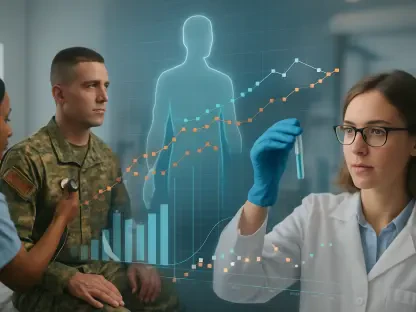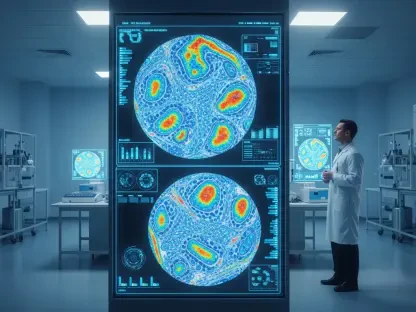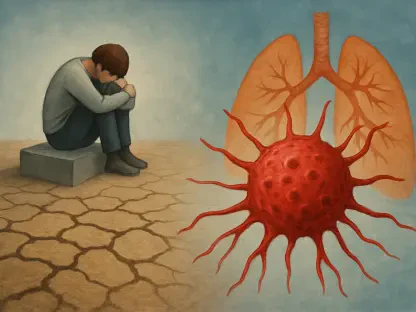With a population rapidly approaching 9.7 billion, the challenge of efficiently and sustainably feeding the world has never been more urgent. Innovative solutions are vital to tackle potential environmental and resource depletion issues associated with traditional agricultural practices. One promising path lies in nanotechnology, a field spearheaded by Shruti Choudhary of the University of Miami. Her early-stage startup, Smart Aerosol Technologies (SmArT), is leveraging the potential of zinc nanoparticles to reimagine how crops are cultivated and nourished. Her groundbreaking work in this domain is poised to revolutionize farming methods and contribute to a more sustainable future. By employing SmArT’s advanced nanotechnology, crops can achieve enhanced yields and reduced environmental impact, offering potential solutions to global food production challenges.
The Promise of Nanofertilizers
Efficient Absorption
SmArT’s nanofertilizers are crafted to transform traditional agricultural practices, addressing inefficiencies in nutrient uptake. Standard fertilizers often have poor absorption by plants, leaving a significant portion to leach into the soil and water systems. This not only results in wasted resources but also poses environmental risks, such as harmful algal blooms. SmArT tackles this issue by engineering zinc nanoparticles that are adept at direct absorption through plant leaves. Mung beans, renowned for their nutritional advantages, demonstrated improved phosphorus uptake facilitated by enhanced enzyme activity in Choudhary’s study. These nanoparticles are shifting the paradigm of fertilizer use, emphasizing both productivity and ecological stewardship. Farmers engaging with SmArT’s technology have experienced notable increases in crop outcomes, particularly in corn and soybeans grown in Illinois. The strategic uptake mechanism of these nanoparticles ensures nutrients are efficiently utilized, promoting optimal growth and yield sustainability.
Broad Spectrum Benefits
Nanofertilizers not only promise increased yields but also enhance the nutritional profile of crops—a crucial factor in tackling global food quality alongside production demands. Shruti Choudhary’s leadership at SmArT ensures the adoption of strategies that prioritize substance and health in agriculture. Zinc oxide nanoparticles applied in tomatoes are a prime example, reportedly increasing antioxidant levels by over 100 percent. Such advancements suggest the dual capacity of nanofertilizers to meet global quantitative targets while elevating qualitative standards in agriculture. In addition to yield and nutritional gains, the SmArT approach aligns with a wider institutional pivot toward sustainable agriculture, focusing on minimizing ecological impact. This synergy embodies the contemporary shift toward high-efficiency, mindful farming systems dedicated to ecological preservation amidst global hunger challenges.
Funding and Testing Initiatives
Securing Financial Backing
Shruti Choudhary’s recent achievements in securing essential funding exemplify the growing recognition and support for innovative agricultural technology. Her successes at prominent events like the eMerge Americas’ Startup Showcase and University Startup Accelerator USTAAR underscore the industry’s confidence in SmArT’s potential. This financial support is crucial for expanding research initiatives to practical applications, including nanofertilizer testing on local crops in diverse environments throughout Florida. The acquired funding extends beyond mere financial transactions, representing a collective affirmation of the practical solutions SmArT offers amid evolving agricultural concerns. Testing initiatives will allow for examination under different conditions, enhancing the adaptability and efficacy of SmArT’s nanotechnology in real-world farming scenarios, which is essential for demonstrating its transformative potential.
Broad Research Spectrum
Beyond agriculture, Choudhary’s innovative spirit is evident in various domains, reflecting a holistic approach to scientific inquiry. Her research ventures have examined COVID-19 transmission patterns in healthcare settings and aerosol emissions impacting firefighters, addressing both public health and safety. Notably, SmArT focuses on developing sensors for identifying particulate matter composition, proving valuable for environmental monitoring and pollution control. Choudhary’s commitment to multidisciplinary research underscores her comprehensive vision for technological advancements that enhance societal well-being alongside environmental preservation. This broader research portfolio not only augments SmArT’s agricultural innovation but showcases her dedication to creating solutions that inherently benefit human health and environmental integrity.
Global and Personal Implications
Transformational Impact on Agriculture
The research conducted by Choudhary and SmArT not only promises solutions in agriculture but also offers broader implications for regions facing scarce resources, including water. Her inspiration drawn from personal connections—her grandfather’s farming experience in drought-prone Rajasthan, India—highlights the essential drive to develop technology with practical, tangible benefits. Nanotechnology’s potential as a resourceful tool fosters agricultural sustainability in areas challenged by such environmental hardships. This motivation reflects a genuine aspiration to enhance farmer livelihoods through innovative means, fortifying agriculture against adverse conditions. Choudhary’s connection to this mission amplifies the relevance of her work for farmers worldwide, showcasing nanotechnology’s capability to foster resilience and adaptation in contemporary agricultural landscapes.
Upward Momentum
SmArT’s innovation in nanofertilizers is a game-changer for agriculture, addressing the inefficiency in how plants absorb nutrients. Unlike traditional fertilizers, which often fail to be fully absorbed by plants, leading to runoff into soil and waterways and causing environmental issues like algal blooms, SmArT employs zinc nanoparticles. These are specifically designed to be absorbed directly through plant leaves, ensuring nutrients reach where they’re needed most. In studies such as Choudhary’s research on mung beans, these nanoparticles facilitated better phosphorus uptake by boosting enzyme activity. This technology is redefining fertilizer use, balancing productivity with ecological care. Farmers using SmArT’s solutions, especially in Illinois, report significant crop improvements, notably with corn and soybeans. The nanoparticles’ strategic absorption method ensures nutrient efficiency, supporting optimal plant growth and sustainable yields. SmArT is paving the way toward a more productive and environmentally responsible agricultural future.









